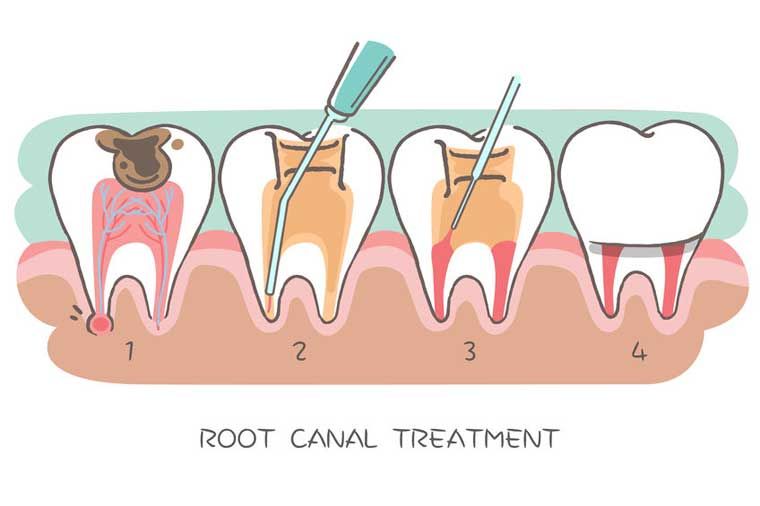Our teeth are made up of 3 layers. The outermost white layer of our tooth is the hardest material in our entire body, called enamel. The second layer beneath the enamel is dentine. Beneath dentine, there is a third layer called pulp. This soft layer contains blood vessels and connective tissues to provide nutrients to the teeth while they are forming during infancy. It helps the roots of your teeth grow.
The roots that bring nutrients to the teeth are the root canals. But in everyday lingo, root canal is referred to the treatment that becomes necessary when the pulp is inflamed and gets infected by bacteria that causes decay.
There are many reasons when the pulp gets inflamed and needs to be treated because of the intense decay, caused by injuries like chip or a crack in tooth, trauma by accident etc. The inflamed pulp has to be treated or it will lead to further infection and unbearable pain.
What is the root canal procedure?
The root canal procedure is an endodontic treatment performed to save the tooth from coming loose due to deep infection and loss of dental structure. It involves removal of the inflamed and infected pulp from the roots of the tooth, and very carefully cleaning and disinfecting the area with a disinfectant spray.
After cleaning and disinfecting the area, it is sealed with a rubber like material called gutta percha. The cavity thus created has to be filled in with a dental filling after a day.
How does root canal procedure help?
Root canal procedure prevents loss of teeth from dental decay and infection. We are given a bounty in the shape of our teeth which are our gateway to nutrition and health. Oral health is very important for overall general health.
Our emotional well-being is expressed through our smile and teeth. Our natural teeth should be saved from falling out because natural teeth always work better than artificial crowns. It is the duty of the dentists to try and save the natural teeth as much as they can.
Root canal treatment helps save the natural teeth to allow for efficient chewing process, proper biting and good appearance.
Is root canal treatment painful?
There are myths about root canal treatment which needs to be explained and dispelled. Before modern technology became available, root canal treatment was actually painful. Today, this is not true at all.
Anaesthesia is used to minimize the pain around the affected tooth. In fact, the toothache caused by decay and infection is far greater than you would feel at the endodontic treatment in your dentist�s office.
The pain of decayed tooth can be easily remedied with the root canal with minimum discomfort, and it will also save the tooth which you may lose if you do not get the decay cleaned out.
There are still some people who believe that it is better to get your tooth pulled out than opt for root canal treatment. This is a myth. As has been proved time and again, saving the natural teeth is the best thing to do because artificial crowns can never replace real natural teeth.
Today the endodontic treatments are very successful and root canal treatment is very effective in preventing teeth loss and many other oral health issues. People were once afraid of the pain it may cause. But with advanced technology in the field of dentistry the root canal treatment has become a routine procedure performed every day on thousands of people all over the world.
It is not painful as such but the effect of anaesthesia will take a little time to wear off. Today with the use of laser technology the root canal procedure has become even more easier to get through.
What are the symptoms to watch out for?
Usually, lingering pain is the first indication of decay in the tooth. When you mention the pain, the dentist will check the area to decide the extent of decay. Other symptoms include swollen and red gums. If you notice that your gums are tender to the touch, you must call the dentist. Some people develop sensitivity to hot and cold foods that lingers on even after the food has been removed.
Should you be worried at the suggestion of root canal treatment?
No. There is absolutely no reason for you to worry about root canal. As we know by now, the endodontic field of dentistry has advanced a lot. There is virtually no pain except for that initial syringe to numb your area around the affected tooth! Apart from that there is no pain.
Once the area is numb you can relax and let the endodontist do their work. They will remove the infected pulp with tiny needles and clean the area.
After the root canal procedure, you can straight away go to work or school, or do what you routinely do, except you cannot eat anything till the numbness has gone away completely. You will also be advised not to eat or drink for a few hours since the area of the affected tooth may be sore. After an hour or two you can drink something at room temperature and avoid anything hot, as it may open the wound and make the area irritable. Apart from these, there is no change in your routine.
Conclusion
Root canal treatment generally takes about one to two visits, with a follow-up visit scheduled for six months after the procedure is completed. The first step in determining if you need root canal treatment is to schedule an appointment with your dentist so he or she can examine your tooth.
Root canal treatment is a necessary procedure for repairing and preserving teeth that have been damaged by infection or decay. Once the pulp (nerve and blood vessels) of a tooth has been infected or decayed, it can no longer heal on its own and must be removed. The goal of root canal treatment is to remove the infected pulp, clean and disinfect the canals, and then seal them with a filling.
Root canal treatment is a procedure that many people are apprehensive about, but it's an important step in maintaining good oral health. If you're feeling anxious or uneasy about the idea of root canal treatment then talk to your dentist first and ask them for more information on what this procedure entails.


